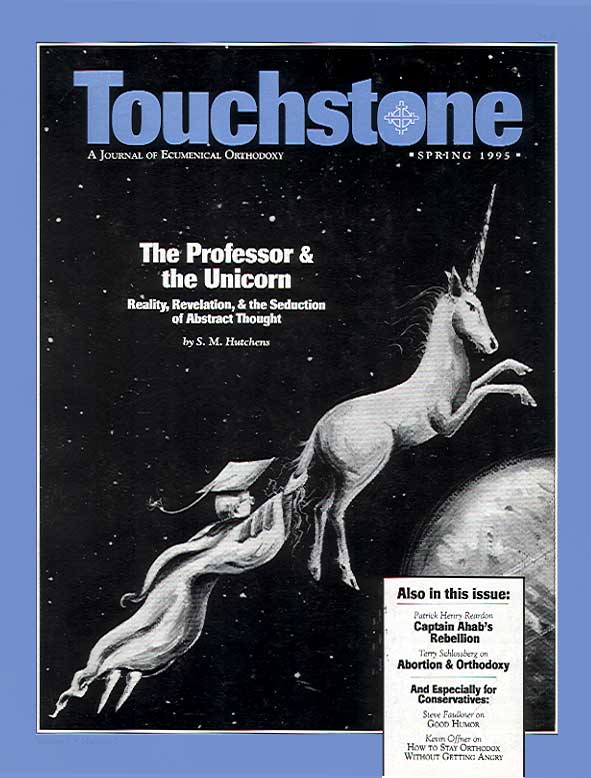The Light We Have
In the last issue, S. M. Hutchens well explained how we at Touchstone treat those who promote the ordination of women (“Making an Issue of It: A Word from the Gnomes,” Touchstone 8.1, Winter 1995). Something more should be said to explain why we oppose them, when arguing against them seems not only uncharitable but also to waste time on a secondary question when the world desperately needs to hear the gospel. We act as we do in part for a reason that may surprise even our readers: because we are agnostic about human abilities to know the truth.
Since the Enlightenment, doctrinal innovators have sold themselves as friends of reason and enemies of dogma, fearless skeptics accepting nothing on blind faith, but believing only what can be proven from the facts, mature people comfortable with ambiguity and complexity, defenders of justice and equality and all other virtues—and therefore locked in mortal combat with the forces of ignorance and reaction, the gnomes and Pharisees who thoughtlessly accept simple and self-serving dogmas inherited from the dark and primitive past.
This claim is, I think, nearly the reverse of the truth. To the extent we are dogmatic, we alleged gnomes are dogmatic because we are (intellectually if not always personally) humble, and we are humble because we are comfortable with ambiguity and complexity, believe only what can be proven from the facts, accept nothing on blind faith, are friends of reason and enemies of dogma in the sense the innovators use the word.
Agnosticism & Women’s Ordination
In other words, we oppose the ordination of women because we want to keep alive within the Church the Christian understanding of man in his right place. We want to remind the Church that in this world we see as in a mirror darkly, and it is foolish, indeed ungodly, to pretend to see better than we do.
Of course many ordained women and their supporters say this too. We cannot judge their hearts, but it is obvious to us that the exegetical gymnastics and the complete rejection of tradition needed to support the innovation go beyond the evidence—claim more light—than we have been given. The innovator must claim to know what the Bible really means and to know that better than nearly everyone else who has ever read it. And if I had the space I could show from the books of the most conservative of innovators a dogmatic insistence on what they believe God must intend, particularly that he intends equality understood in the modern sense of interchangeability.
In contrast, we at Touchstone, and I think the “ecumenically orthodox” generally, will gladly admit to knowing very little about the ways of man and even less about the ways of God, and to being (on our own) naturally agnostic about the answers to most questions that face us. We confess to being small and sinful creatures with an astonishing capacity to get things wrong and to deceive ourselves when it is useful, and (such is the nature of sin) even when it isn’t useful. When feminists claim that “God is beyond all our categories,” we respond: “well, yes, of course, we never said he wasn’t.” But we will then add that something more must be said: that God has given us his categories. It really isn’t very bright to stop at “God is beyond our categories” without investigating the possibility that the Incomprehensible has made Himself comprehensible.
In other words, our agnosticism is the reason we depend on Scripture and Tradition, because it makes us understand that only in these are God’s categories to be found. We do not pretend to know the truth on our own. This agnosticism about ourselves produces a confidence in the truth that even our friends misinterpret as self-righteousness, fear of change, or simple stupidity.
The Sensible Person
The one who knows he does not understand how to work his new VCR will, if he has any sense at all, read the owner’s manual and ask other owners for help in interpreting it. He will not say “Electronics is beyond all my categories” and return the VCR to the store. If the manual seems to say put wire A into connection A, and people who have had the same VCR for years tell us to do so, we (being sensible people) put wire A into connection A.
We should do so—we must do so, if we want our VCR to work right—even if friends whose sincerity and knowledge of such things we generally trust, tell us that they put wire A into connection B. We would be wrong to ignore the manual and the experts simply at our friends’ urging and on the basis of their recent experience. Besides, they do not seem to read the manual very well or take it as seriously as they ought. Many are inclined to ignore or even resent the help of more experienced owners, and others, a surprisingly large number, automatically do the opposite of whatever experienced owners suggest.
Even though they are now sitting happily in front of their television watching a videotape, and although we make no claims to expertise ourselves, we should warn them that something will go wrong sometime if they don’t change the connection. Already the picture is not as sharp or clear as it should be, and the fuse occasionally blows.
Even with VCRs many people try to figure out the instructions on their own and resent help. How much more easily and often do people do so with a theological question, when the rewards of innovation are so great, and the results not as easily tested or errors so obvious.
Stray Sheep
How, then, are we to treat those good people who insist on putting wire A into connection B and urge others to do so? Let me add to Hutchens’s remarks that we must, in charity, assume that the otherwise orthodox are ignorant or confused, especially about an idea (in this case “equality”) so widely and deeply held, because there are aspects of the truth in every age only a cognitive minority can recognize. We assume on the evidence of their lives and words that they are wrong about an essential practice but not in conscious rebellion against the Giver thereof.
Nevertheless, we must keep a certain distance even in cooperation, because such an error too easily leads to greater error, if not in oneself then in those one teaches. Refusing or failing to hear the Master’s instructions on one thing may easily lead to refusing his instructions on another, or even to rejecting his right to instruct.
Those who accept women’s ordination may easily come to accept “faithful monogamous homosexual relationships,” for example, and already some self-consciously evangelical Christians have done so. As St. Paul’s belief in equality was held to trump his specific teachings about male headship, so his praise of charity may equally plausibly be said to trump his teachings about homosexuality. If those who hold the first do not go on to hold the second, they are being restrained not by theology but by instinct or prejudice, neither of which are adequate protection from apostasy.
Even so, our friends ask us why we cannot at least put away the issue for a time, because our opposition wastes time that should be given to preaching the gospel. We don’t because the New Testament itself does not offer a gospel separable from the ordered life of the community. The Apostles expected their people not only to tell others about the Lord but also to act in several quite specific ways. St. Paul did not think that preaching Christ and him crucified required that the practices he ordained (like the exercise of loving headship by men and submission by women) be set aside.
A Deadly Light
For this reason we at Touchstone continue to oppose the ordination of women, when such opposition seems uncharitable, or an offense against the gospel, even to our friends. We do not claim to be especially wise. We do claim to know our limits and therefore to know where and how wisdom is to be found, and where it is not likely to be found. In our own small way, we try to promote, against the inflated self-image of the age, the true measure and stature of man.
We defend agnosticism and humility, to remind the Church that it depends upon God to see rightly even in this world. We instinctively respond to any attempt to claim more light than we have, or to see new truths by a newer and supposedly brighter light. Such a claim, however unintentional, is implicit in the ordination of women.
One would think such a commonsensical position would get a more sympathetic hearing than it has. In our century, the certainties of progressive intellectuals have justified the killing of millions and millions of people, and millions more are alive only because Western intellectuals never achieved all the power they craved. With a few exceptions, it was those who claimed the greatest enlightenment—George Bernard Shaw comes to mind—who cheered Hitler and Stalin and suggested the sterilization of “the unfit.” The “dogmatic” and “unenlightened” by and large rejected the secular intellectuals’ murderous visions of the Kingdom of Heaven on Earth.
In this century, the bright certainties of the progressives have repeatedly proved to be not a new light to enlighten the gentiles, but a dark night infested by monsters. Or rather, the light of the doctrinal innovators is the light of a powerful movie projector, throwing over reality the pictures we prefer to see, and in its glare hiding from our sight the way our world really is. And thereby it leads us, as we try to walk by it, to keep tripping over rocks and walking into trees, and eventually, inevitably, to fall to our deaths. Unexpectedly, perhaps, agnosticism in the sense I have used it lights one’s way through life, reveals glories and beauties untold, because we see what is really there by the light we have been given. If we cannot see far by this light, if it offends us by not being brighter, it is still enough light to keep walking, for the light we have is a light unto our path.
Those who know they see as in a mirror darkly will look more carefully and will treasure such light as they have, and will not pretend to have more. And they will feel bound, in charity, to tell those who walk by their own light, though their number be great, their status high, and their triumph seemingly complete, that they cannot see.
—David Mills
David Mills has been editor of Touchstone and executive editor of First Things.
subscription options
Order
Print/Online Subscription

Get six issues (one year) of Touchstone PLUS full online access including pdf downloads for only $39.95. That's only $3.34 per month!
Order
Online Only
Subscription

Get a one-year full-access subscription to the Touchstone online archives for only $19.95. That's only $1.66 per month!
bulk subscriptions
Order Touchstone subscriptions in bulk and save $10 per sub! Each subscription includes 6 issues of Touchstone plus full online access to touchstonemag.com—including archives, videos, and pdf downloads of recent issues for only $29.95 each! Great for churches or study groups.
Transactions will be processed on a secure server.
more from the online archives
calling all readers
Please Donate
"There are magazines worth reading but few worth saving . . . Touchstone is just such a magazine."
—Alice von Hildebrand
"Here we do not concede one square millimeter of territory to falsehood, folly, contemporary sentimentality, or fashion. We speak the truth, and let God be our judge. . . . Touchstone is the one committedly Christian conservative journal."
—Anthony Esolen, Touchstone senior editor









